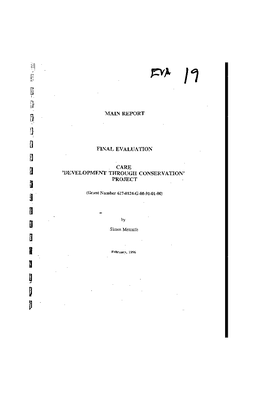Final evaluation: CARE Development through Conservation project
Four categories of activities of Phase II of CARE's Development through Conservation Project (DTC) were evaluated: Community conservation activities, which focused on education, raising local awareness of the multiple use program and of conservation needs such as harvesting from the park, and animal control; Development activities, which focused on agriculture, agroforestry, methodology and gender issues; Park management activities, which cultivated a relationship between Uganda National Parks (UNP), local communities and parish representatives; Institutional relations and management activities, which focused on stakeholders and project adaptability. The ultimate goals of the project were to protect biodiversity and ecological processes of Bwindi Impenetrable Park and Mgahinga Gorilla National Park. Many project objectives were met and it is recommended that this project continue. In local communities’ eyes, development activities served as compensation for exclusion from protected forest resources. Community extension workers in this aspect of the project were important in instilling local acceptance of project plans. Park management activities were successful in enhancing capacities, producing progressive park management plans, and developing a community conservation ranger service. Institutional activities have proven to be adaptable and have successfully linked voluntary and formal institutions in order to promote stable resource governance. It is suggested that CARE enhance communities’ problem-solving abilities, and create more connections and foster coordination between the DTC projects, districts and lower organizational structures. UNP’s management and implementation capacities should continue to be increased. Synergism in DTC activities could be increased by actions such as linking project activities with the Government of Uganda’s decentralization and environmental management programs.
https://biodiversitylinks.org/library/resources/rmp/library/content/tools/community-based-natural-forest-management-USAID-Lessons-Learned/cbnfm/USAID-BDB-cd-2-data/care-dtc-final.pdf/view
https://biodiversitylinks.org/library/resources/rmp/library/content/tools/community-based-natural-forest-management-USAID-Lessons-Learned/cbnfm/USAID-BDB-cd-2-data/care-dtc-final.pdf/@@download/image/image.png
File
Final evaluation: CARE Development through Conservation project
Author(s):
Simon Metcalfe
Publication Date: 1996
Location: Africa
DOWNLOAD FILE
Four categories of activities of Phase II of CARE's Development through Conservation Project (DTC) were evaluated: Community conservation activities, which focused on education, raising local awareness of the multiple use program and of conservation needs such as harvesting from the park, and animal control; Development activities, which focused on agriculture, agroforestry, methodology and gender issues; Park management activities, which cultivated a relationship between Uganda National Parks (UNP), local communities and parish representatives; Institutional relations and management activities, which focused on stakeholders and project adaptability. The ultimate goals of the project were to protect biodiversity and ecological processes of Bwindi Impenetrable Park and Mgahinga Gorilla National Park. Many project objectives were met and it is recommended that this project continue. In local communities’ eyes, development activities served as compensation for exclusion from protected forest resources. Community extension workers in this aspect of the project were important in instilling local acceptance of project plans. Park management activities were successful in enhancing capacities, producing progressive park management plans, and developing a community conservation ranger service. Institutional activities have proven to be adaptable and have successfully linked voluntary and formal institutions in order to promote stable resource governance. It is suggested that CARE enhance communities’ problem-solving abilities, and create more connections and foster coordination between the DTC projects, districts and lower organizational structures. UNP’s management and implementation capacities should continue to be increased. Synergism in DTC activities could be increased by actions such as linking project activities with the Government of Uganda’s decentralization and environmental management programs.



